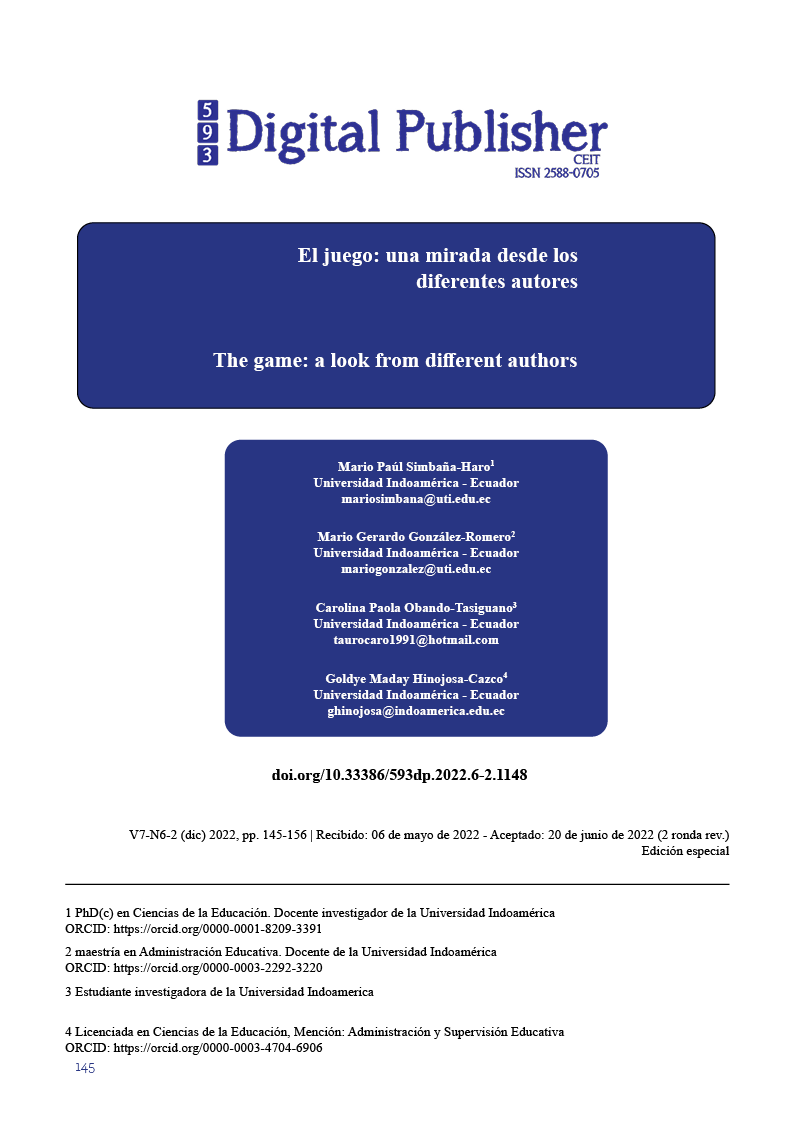The game: a look from different authors
Main Article Content
Abstract
The game a look from the different authors is a theme, which focuses on the fact of ratifying the importance of this activity within the educational process, the game plays an unconditional and irreplaceable role within this area, through history it is identifies that the various authors qualify it as essential, primordial and natural; It is for this reason that teachers must recognize its importance to be able to put it into practice within the educational task, since in this way the integral development benefits. TARGET. Describe how the game has evolved in the educational field, through the exposition of some theories and contributions from various authors, to recognize its importance and transcendence in the development of children. METHOD. This research is based on a qualitative approach, through a bibliographic-descriptive review of legally recognized magazines and books that have ISSN or ISBN, articles that are within the years 2016 to 2021 were included, theses, repositories and blogs were excluded. , the bibliographic search action was exhaustive, digital and automated, through the Publish or Perish program, the search engines used were Academic.Microsoft and Google Academic. RESULTS. A timeline was drawn up rescuing the chronological contributions of the evolution of the game and two comparative tables were drawn up which answer the investigative questions, different contributions about the game are evidenced, brief descriptions of some game theories can be found and aspects are mentioned relevant.
Keywords: ludic theories and approaches, integral development, evolution of the.
Downloads
Article Details

This work is licensed under a Creative Commons Attribution-NonCommercial-ShareAlike 4.0 International License.
1. Derechos de autor
Las obras que se publican en 593 Digital Publisher CEIT están sujetas a los siguientes términos:
1.1. 593 Digital Publisher CEIT, conserva los derechos patrimoniales (copyright) de las obras publicadas, favorece y permite la reutilización de las mismas bajo la licencia Licencia Creative Commons 4.0 de Reconocimiento-NoComercial-CompartirIgual 4.0, por lo cual se pueden copiar, usar, difundir, transmitir y exponer públicamente, siempre que:
1.1.a. Se cite la autoría y fuente original de su publicación (revista, editorial, URL).
1.1.b. No se usen para fines comerciales u onerosos.
1.1.c. Se mencione la existencia y especificaciones de esta licencia de uso.
References
Aguado, J. M., Martínez, I., & Cañete, L. (2015). Tendencias Evolutivas del Contenido Digital en Aplicaciones Móviles. http://eprints.rclis.org/30299/1/10.pdf: eprints.
Achavar, C. (2019). Beneficios del juego en la acción pedagógica. Foro Educacional, Volumen(33), 155 –122. file:///C:/Users/edupo/Downloads/Dialnet-BeneficiosDelJuegoEnLaAccionPedagogica-7287886.pdf
Ascheri, M., Testa, O., Pizarro, R., Camiletti, P., Diaz, L., & Marino, S. (2015). Desarrollo de aplicaciones para la enseñanza de la matemática con dispositivos móviles. Jornadas de Enseñanza e Investigación Educativa en el campo de las Ciencias Exactas y Naturales (pág. s/p). La Plata: Universidad Nacional de La Plata. http://sedici.unlp.edu.ar/bitstream/handle/10915/58800/Documento_completo.pdf-PDFA.pdf?sequence=1&isAllowed=y: sedici.
Caicedo, C., Toala, M., Murillo, L., Romero, M., Pilay, C., & Figueroa, G. (2020). Aplicación móvil para el fortalecimiento de capacidades lógico-matemáticas. https://www.revistaespacios.com/a20v41n23/a20v41n23p18.pdf: Revista Espacios.
Campión, R. S., Amo Filvá, D., & Díez Ochoa, A. (2014). ¿PUEDEN LAS APLICACIONES EDUCATIVAS DE LOS DISPOSITIVOS MÓVILES AYUDAR AL DESARROLLO DE LAS INTELIGENCIAS MÚLTIPLES? EDUTEC Revista Electrónica de Tecnología Educativa, 1-10. http://edutec.rediris.es/Revelec2/Revelec47/n47_Santiago-Amo-Diez.html
Carreras, C.(2017). Del homo ludens a la gamificación. Quaderns de filosofia, 4(1), 7 – 18. https://roderic.uv.es/bitstream/handle/10550/58782/5991399.pdf?sequence=1&isAllowed=y
Carrión, A. (2020). El juego y su importancia cultural en el aprendizaje de los niños en educación inicial. Revista de Ciencia e Investigación, 5(2), 132 – 149. https://dialnet.unirioja.es/servlet/articulo?codigo=7398049
Cuellar, M., Tenreyro, M. y Castellón, C. (2017). El juego en la educación preescolar. fundamentos históricos.Revista Conrado, 14(62), 117 – 123. https://conrado.ucf.edu.cu/index.php/conrado/article/view/693
Gallardo, J. (2018). Teorias del juego como recurso educativo. Innovagogia, Volumen(33), 1 – 12. https://rio.upo.es/xmlui/bitstream/handle/10433/6824/Gallardo-LpezJos-AlbertoGallardo-VzquezPedro.pdf?sequence=1&isAllowed=y
Gallardo, J. y Gallardo, P. (2018). Teorías sobre el juego y su importancia como recurso educativo para el desarrollo integral infantil. – Revista Educativa Hekademos, (24), 41 – 51. file:///C:/Users/edupo/Downloads/Dialnet-TeoriasSobreElJuegoYSuImportanciaComoRecursoEducat-6542602.pdf
Gallardo, J., García, I., y Gallardo, P. (2019). Análisis de las principales teorías del juego en el ámbito educativo. BrazilianJournal of Development, 5(8), 1–15. https://rio.upo.es/xmlui/bitstream/handle/10433/6785/articulo%20brasil.pdf?sequence=1&isAllowed=y
García, L. (2016). El juego y otros principios pedagógicos. Supervivencia en la educación a distancia y virtual. RIED Revista Iberoamericana de Educación Superior a Distancia, 19(2), 9 – 23. https://www.redalyc.org/pdf/3314/331445859001.pdf
Grisales, A. (2018). Uso de recursos TIC en la enseñanza de las matemáticas: retos y perspectivas. Entramado, 198-214. http://www.scielo.org.co/pdf/entra/v14n2/1900-3803-entra-14-02-198.pdf
Mercadé, A. (s/f). https://materialestic.es/. Transición a la Vida Adulta y Activa: https://materialestic.es/transicion/apuntes/Los.8.tipos.de.inteligencia.segun.Howard.Gardner.pdf
Ministerio de Educación. (2014). Currículo de Educación inicial 2014.Ministerio de Educación. https://educacion.gob.ec/wp-content/uploads/downloads/2014/06/curriculo-educacion-inicial-lowres.pdf
Ministerio de Telecomunicaciones y de la Sociedad de la Información. (2020). Logros de la Revolución Tecnológica en Ecuador, se destacan por el Día Nacional de las Telecomunicaciones. https://www.telecomunicaciones.gob.ec/logros-de-la-revolucion-tecnologica-en-ecuador-se-destacan-por-el-dia-nacional-de-las-telecomunicaciones-2/.
Monge, M., Méndez, M., Hernandez, M., Quintana, C y Presa, E. (2019). La importancia del juego en los niños. Dialnet, 43(1), 31 – 35. file:///C:/Users/Docente/Downloads/Dialnet-LaImportanciaDelJuegoEnLosNinos-7186932.pdf
Mora, C., Plazas, F., Ortiz, A. y Camargo, G. (2016). El juego como método de aprendizaje. Rollos Nacionales, 4(40), 137 – 144. https://revistas.pedagogica.edu.co/index.php/NYN/article/view/5244/4010
Morales, O. y Urrego, Z. (2017). La enseñanza por medio del juego para un mejor aprendizaje. Revista UNI MINUTO, 17(20), 123 – 136. https://revistas.uniminuto.edu/index.php/praxis/article/view/1483/1430
Navarro Fernández, R., Vega Velarde, M., Chiroque Landayeta, E., & Rivero Panaqué, C. (2018). Percepción de los docentes sobre las buenas prácticas con un aplicativo móvil para la enseñanza de matemáticas. Educación, 81-97. ttps://dx.doi.org/10.18800/educacion.201801.005
Pere, C., y Meritxel, E. (2018).Moodle al servicio de la gamificación del aprendizaje. Campus Virtuales, 7(2), 9 – 25. https://redined.educacion.gob.es/xmlui/bitstream/handle/11162/175596/Art.%201.pdf?sequence=1&isAllowed=y
Primer videojuego. (21 de enero de 2022). En Wikipedia.https://es.wikipedia.org/w/index.php?title=Primer_videojuego&oldid=141106352
Sanz, P. (2019). El juego divierte, forma, socializa y cura. SciELO, 21(83) 307– 312. https://scielo.isciii.es/pdf/pap/v21n83/1139-7632-pap-21-83-307.pdf
Sarle, P. (2017). La escuela infantil: Identidad en juego. Revista Digital, 8(11), 1 – 11. file:///C:/Users/Docente/Downloads/3644-11672-1-PB%20(1).pdf
Savedra, E., Ojeda, R., Suarez, S. y Aguzzi, A. (2018). La función del juego en la construcción de los recursos subjetivos en la infancia. Una contribución desde la teoría psicoanalítica. Anuario de investigaciones, 25(número de la revista), 1–10. https://www.redalyc.org/journal/3691/369162253031/html/
Tamayo, A. y Restrepo, J. (2017). El juego como mediación pedagógica en la comunidad de una institución de protección, una experiencia llena de sentidos. Revista Latinoamericana de estudios educativos, 13(1), 105–128. https://www.redalyc.org/pdf/1341/134152136006.pdf
UNICEF. (2018). Aprendizaje a través del juego. UNICEF.https://www.unicef.org/sites/default/files/2019-01/UNICEF-Lego-Foundation-Aprendizaje-a-traves-del-juego.pdf
Valencia, C. (2019). Beneficios del juego en la acción pedagógica. Dialnet, Volumen(33), 115 – 122. file:///C:/Users/Docente/Downloads/Dialnet-BeneficiosDelJuegoEnLaAccionPedagogica-7287886.pdf





